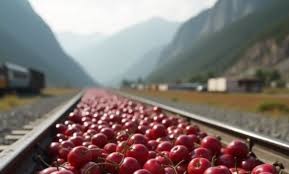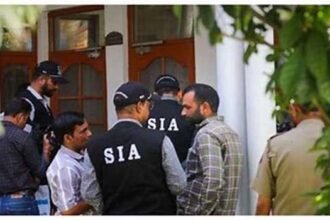Indian Railways is poised to transform the logistics landscape of Kashmir’s horticulture sector with the launch of its first dedicated cargo train service for cherry exports from Katra to Mumbai, commencing June 3, 2025. This development is widely regarded as a game-changer by growers and industry leaders, as it promises to cut transportation costs, minimize post-harvest losses, and unlock new markets for Kashmir’s highly valued cherries. For decades, cherry growers in Kashmir—who produce over 90% of India’s cherries, with a 2025 output estimated at 12,000 to 13,000 metric tons—have relied on costly and sometimes unreliable air cargo to reach distant markets. The new rail service introduces a cost-effective and reliable alternative, marking a pivotal moment in the region’s agricultural logistics.
The inaugural shipment will see a refrigerated parcel van, secured through a Value Payable (VP) indent, carrying a 24-ton consignment of fresh cherries from Shri Mata Vaishno Devi Katra railway station to Bandra in Mumbai. This journey, covering nearly 2,000 kilometers, is expected to take just over 30 hours, ensuring that the cherries arrive fresh and in optimal condition. The initiative is the result of extensive collaboration between Northern Railways, the Jammu & Kashmir Horticulture Department, and local fruit growers’ associations, who have worked together to overcome logistical and operational challenges. The arrangement, which requires advance payment for the full parcel van regardless of actual quantity shipped, is designed to reduce post-harvest losses and improve growers’ returns by ensuring safe and timely transportation of this perishable crop.
For cherry growers, the benefits are substantial. Rail transport offers a much more affordable option compared to air freight, with the freight cost now reduced to just Rs 8 per kilogram—a substantial economic advantage for growers, especially small and medium-scale farmers. The ability to access distant, high-value markets like Mumbai is anticipated to boost growers’ earnings and enhance the competitiveness of Kashmir’s horticultural products nationwide. The refrigerated rail service is also expected to significantly reduce spoilage and wastage, which have long plagued the industry due to the cherry’s short shelf life and the limitations of road or air transport. By ensuring temperature-controlled transit, the new service will help preserve fruit quality and reduce losses, directly benefiting the bottom lines of thousands of families dependent on cherry farming.
The launch of the cargo train is particularly significant given the challenges faced by growers in recent years. Many, like Fayaz Ahmad Bhat from Tangmarg, have suffered losses due to road closures and unpredictable weather, which prevented their crops from reaching markets on time. The new rail service offers a more consistent and reliable logistics solution, reducing the risks associated with road transport and minimizing the impact of adverse weather. Additionally, the initiative is expected to reduce road congestion and environmental pollution, making it a more sustainable option for future freight movement.
Despite the optimism, growers have raised some operational concerns. One major issue is the requirement for upfront payment for the full 24-25 ton parcel van, regardless of whether the growers can fill it completely. Since cherry harvesting yields can fluctuate daily, this system poses a financial burden and creates logistical challenges, particularly for smaller consignments. Another concern is the limited frequency of the service; currently, the Vivek Express, which carries the cargo, operates only once a week, while the Swaraj Express runs three times weekly. This restricts the flexibility and consistency of shipments during the short cherry harvesting season. Growers’ associations are actively engaging with railway authorities to advocate for more flexible payment options and increased freight capacity in future runs.
Kashmir’s cherry industry is not only vital for its economy but also for the livelihoods of thousands of families. Cherry is a crucial early-season fruit crop in Kashmir, typically harvested during May and June and serves as an important source of mid-year income for fruit growers before the apple harvest season. The region grows five main varieties of cherries: Mishri (the sweetest and most expensive), Double cherry (widely cultivated for canning, juice, and jam), Makhmali, Black (Gol) and Awal Number, each with its own market demand and uses. However, the crop is extremely sensitive to weather conditions, with heavy rainfall, hailstorms and temperature drops posing significant risks to yield and quality.
Looking ahead, stakeholders are optimistic that if this pilot run proves successful, the service could be expanded to include other perishable fruits such as apples, pears, and plums—potentially revolutionizing cold-chain logistics from Kashmir and further integrating the region’s horticultural sector into national supply chains. Apple traders, in particular, see this as a stepping stone for future rail-based logistics for apples, which are Kashmir’s largest horticultural product. Union Minister Jitendra Singh has hailed the development as a milestone in linking Kashmir’s agricultural economy with national markets. The infrastructure and experience gained from the cherry cargo train could set a precedent for modernizing agricultural logistics across India.
In conclusion, the launch of the dedicated cherry cargo train from Kashmir to Mumbai represents a transformative step for the region’s horticulture sector. By providing a faster, more affordable, and reliable transportation solution, Indian Railways is not only supporting the economic upliftment of Kashmir’s fruit growers but also setting the stage for a new era of prosperity and sustainability in Indian agriculture. If the initiative continues to evolve and address growers’ concerns, it could herald a new chapter for horticultural exports from the valley, benefiting thousands of families and strengthening the region’s economic resilience.







